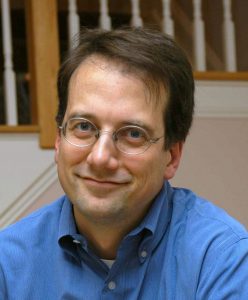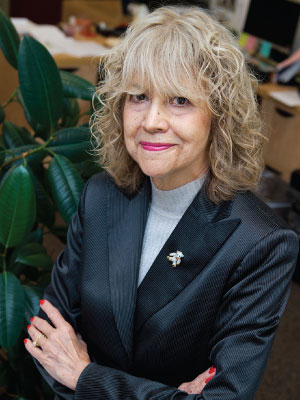A teacher says students learn better when they see themselves in what we teach
Alex Corbitt is teaching 7th-grade English in the very same classroom at M.S. 331, the Bronx School of Young Leaders, where he student taught as a Fordham graduate student. In nearly five years at the school, Corbitt has developed culturally relevant curricula, taught his students to make podcasts, and helped bring 2,000 books into the building. And on his break? He and his colleagues play pickup basketball with the kids.
Last year he was named to the International Literacy Association’s “30 Under 30” list, an honor bestowed on teachers and other rising young leaders. Corbitt said it was gratifying to win for his work in a renewal school—the city’s designation for an underperforming school trying to turn itself around.
“It gives me hope that we’re not just shouting-out schools and teachers who get high test scores, but also teachers who are trying to authentically recognize their students and empower them,” he said. “We are working every day to close the achievement gap. Over the past three years [at M.S. 331], we’ve really come together and supported each other as a community.”
With students who are mostly Dominican, Puerto Rican, and West African, Corbitt seeks out literature that they can relate to—including stories about students of color in New York City.“I think when students read and write they need to be able to see themselves in the content,” he said.
A big proponent of technology in the classroom, Corbitt participated in a digital literacies collaborative, a network of educators run by Kristen Turner, Ph.D., who taught at the Graduate School of Education. The group’s demonstration on iPhone podcasts inspired a lesson for Corbitt’s teen activism class, in which students watched a documentary about racism and interviewed each other to make podcasts of their own.
Corbitt credits Fordham for placing him in the struggling school back then. “I think Fordham really understands that the best schools to learn how to teach in,” he said, “are the schools that need the best teachers the most. You hone your craft and you become better.”
]]>Alex Corbitt, 26, FCRH ‘12, GSE ‘13, and John Maldonado, 25, FCRH ’13, a doctoral student, were named to the ILA’s second annual “30 Under 30” list, an honor bestowed to teachers, authors, volunteers, researchers, social entrepreneurs, and leaders from 12 countries.
Maldonado, a Rego Park, Queens native who graduated with a double major in psychology and English, became a NYC teaching fellow and taught special education at P368K Star Academy in Brooklyn. He is working towards a doctorate in contemporary learning and interdisciplinary research while teaching English at his alma mater, Archbishop Molloy High School in Queens.
He said being named to the list is a validation of what he called the “ugly hours” that all teachers put in—time when they put in extra hours at home, trying to figure out how to best convey information to their students and how to attend to their additional needs.
“As educators, we don’t often get the credit we deserve,” said Maldonado, who is interested in equity and culture, and the roles they play in education. He noted that, beyond his teaching he worked to increase his students’ technological literacy, “in order to give them more career and life opportunities.”
“To be recognized for that work is really validating,” he said. “I’m lucky to be the recipient. But a lot of teachers are doing the same thing.”
Corbitt, a New Jersey native who earned a bachelor’s from Fordham College at Rose Hill in 2012 and a master’s in English education from the GSE, has likewise been teaching in New York City public schools.
He did his student teaching at MS 331, The Bronx School of Young Leaders, in Morris Heights, and stayed on after graduation to teach seventh-grade English. The school serves a low income population. Corbitt believes that high needs schools are where committed teachers are needed most.
He said the learning curve for teachers was steep, but he grew quickly to rise to the challenges. What helped, he said, was the school’s strong culture of shared learning—teachers frequently duck into each others’ classrooms to observe and assist each other.
“My initial few lessons were just not resonating with the kids, said Corbitt, who acknowledged the struggle to self-analyze one’s teaching, rather than place blame on students. “ Once I pushed myself to make things more relevant and more project-based, more interactive and collaborative, I saw a switch.”
“I saw I could get better, and that has contributed to my personal growth,” he said.
That struggle is more gratifying when acknowledged by an award like the ILA 30 under 30, he said.
“It gives me hope that we’re not just shouting out to schools and teachers who get high test scores, but also to teachers who are trying to authentically recognize their students, give their students a voice, and empower them,” he said.
]]> Jonathan Rochelle, product manager at Google and the co-founder of Google Docs, will deliver the keynote speech at the second annual Fordham Digital Literacies Collaborative conference, to be held July 22 at the Lincoln Center campus.
Jonathan Rochelle, product manager at Google and the co-founder of Google Docs, will deliver the keynote speech at the second annual Fordham Digital Literacies Collaborative conference, to be held July 22 at the Lincoln Center campus.
The focus of the conference will be primarily on the impact of technology on literacy, which Kristen Turner, PhD, professor of education at the Graduate School of Education, wrote about earlier this year.
Turner, a conference organizer, noted that Rochelle, whose talk is entitled “You Should be Innovating,” co-created Google Docs and Sheets, two apps that teachers use regularly in their classrooms. He is also primarily responsible for Google Apps for Education, which reaches more than 40 million educators and students, and most recently launched Google Classroom and Google Expeditions.
“He is passionate about K-12 education. I expect he will talk about how failure is the key to innovation and that we need to experiment in the classroom and allow kids to innovate,” she said.
One of the conference goals is to be able to students to understand technology as an aid to learning, rather than a distraction from it.
Several New York City teachers will share some classroom technology demonstrations. Other speakers will address the ways digital tools affect our lives as individuals and educators, and present ways to use them to engage students in critical and creative thinking.
For more information visit the conference website or contact Kristen Turner at [email protected].
]]>The office’s modest size and relative calm are deceptive, however. The center actually has nearly 80 employees who provide outreach across New York City—and Batisti is at the helm. In addition to serving as associate dean at the Graduate School of Education (GSE), Batisti is the founding director of the center and CEO of the center’s Partnership Support Organization (PSO). The organization is one of only two housed in a New York City university and it provides technical assistance and support to 35 public schools serving more than 19,000 students.

A veteran educator, Batisti is a former administrator in the city’s public school system and has been an adjunct professor at Fordham for 25 years. She recently turned her sights toward early childhood education, a topic that has drawn national attention in the year since President Obama called for high-quality preschool for every child in America. The need for pre-kindergarten education has been proven, Batisti said; satisfying that need in the form of free, full-day, universal pre-K is another challenge entirely.
Nevertheless, Batisti is optimistic that universal pre-K can become a reality, beginning here in New York. This year, GSE and the Center for Educational Partnerships are spearheading a research-based pilot program focusing on early childhood literacy—an initiative that can help bolster the city’s vigorous efforts to provide pre-K for every 4-year-old in New York City.
Why is pre-K so important for children?
AB: In 2000, the U.S. Department of Education convened a National Reading Panel to evaluate the best ways to teach children to read. One of the recommendations was to give young children greater access to school. This gave way to many pre-K classes and all-day kindergartens. As a result, because children were going to school earlier, people felt their reading needs were being addressed. But then the question is: What are kids getting by going to school at younger ages? It’s easy to provide more access, but the panel’s other recommendations, such as strategies for teaching vocabulary and reading comprehension, were harder to implement.
I’m happy that Mayor de Blasio and Chancellor Carmen Fariña are focusing on early childhood, especially for students in high-needs situations. Because the problem is that by the time many of these students reach kindergarten, they have an almost 30 million-word gap [compared to their peers]. If this gap isn’t addressed as early as possible, it becomes harder and harder for them to catch up. Coming in to school with a rich vocabulary is very important both for comprehension and for higher-order thinking and questioning.
How is GSE responding to this national need?
AB: In June, the center received a planning grant from the Brooke Astor Foundation to devise early childhood reading strategies. We’ve selected three high-needs elementary schools that our PSO works with—one each in Brooklyn, Manhattan, and the Bronx—in which we’re going pilot a program designed by GSE faculty members Arlene Moliterno, Lynn Huber, Chun Zhang, and Fran Blumberg. Starting in October, staff developers who are licensed in early childhood literacy will offer 38 days of in-classroom coaching to five teachers at each school. The idea is to provide the teachers with strategies for teaching vocabulary and comprehension, because if the teachers teach better, the students will do better.
What are your expectations for this project?
AB: If this works, we will apply for an implementation grant, which can run for up to three years and allow us to work with many more schools. Right now, we are using this planning grant to fine-tune and pilot the strategies that we’ve developed. If we get this right, I know Fordham will be able to replicate it. The New York City school system is the largest in the nation, with about 1,600 schools and 1.1 million students. So if an initiative like this will work here, it will work anywhere. I think Fordham will be able to come out with a solid model on early childhood vocabulary strategies that any pre-K program will be able to adapt and learn from.
What are GSE and the Center for Educational Partnerships doing to support parochial schools?
AB: The parochial schools in Brooklyn and Queens have large numbers of English-language learners, including newly arrived immigrant students. We recently received a grant from the diocese for a multiethnic teacher leadership program, which will allow a cohort of parochial school teachers to get a master’s in administration at GSE and special training in multi-ethnic and bilingual education. We are beginning an exciting collaboration between the Diocese of Brooklyn and the GSE’s Center for Catholic School Leadership and Faith-Based Education.
]]>